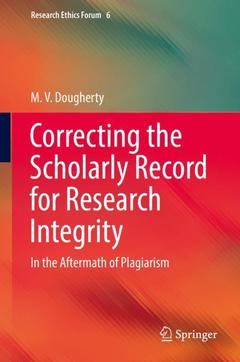Preface
Introduction
Correcting the Scholarly Record
The Integrity of Authorship
Pre-Publication and Post-Publication Responses to Plagiarism
The Purpose of Academic Publishing
A Précis of Chapters
References
1. Defining the Scholarly Record
1.1 The Limits of the Scholarly Record
1.1.1 The Knowledge Condition
1.1.2 The Authorship Condition
1.1.3 The Publication Condition
1.1.4 The Library and the Database Conditions
1.1.5 The Discipline Condition
1.2 Works at the Margin of the Scholarly Record
1.3 The Scholarly Record in Transition
1.4 The Identity of Items of the Scholarly Record
1.5 A Definable Scholarly Record
References
2. What is Academic Plagiarism?
2.1 2.1. Identifying Academic Plagiarism
2.1.1 Appropriation
2.1.2 Non-Triviality
2.1.3 Inadequate Credit
2.1.4 An Appearance of Original Authorship
2.1.5 A Discrete Item of the Scholarly Record
2.2 The Intent to Plagiarize
2.3 Self-Plagiarism
2.4 Euphemisms for Academic Plagiarism
2.5 Plagiarism vs. Copyright Infringement
2.6 Statutes of Limitation for Plagiarism
2.7 In Sum
References
3. A Test Case for Published Corrections: The Discipline of Philosophy
3.1 Classifying Responses to Plagiarism
3.2 Issuing a Statement of Concern
3.3 Issuing a Statement of Retraction (SR)
3.3.1 Maximal and Minimal Statements of Retraction
3.3.2 Paywalled SRs and Untethered SRs
3.3.3 SRs with University Support
3.3.4 Academic Editors and Independent SRs
3.3.5 Problems with Minimal and Medial SRs
3.4 Reprinting a Volume After the Removal of Plagiarized Material
3.5 Halting the Sale of the Plagiarized Material
3.6 Taking No Public Action
3.7 Conclusion
3.7.1 Table 1
3.7.2 Table 2
3.7.3 Table 3
References
4. Academic Whistleblowing
4.1 The Whistleblowing Dilemma
4.2 To Whom Can One Blow the Academic Whistle?
4.2.1 Whistleblowing Directly to the Suspected Plagiarist
4.2.2 Whistleblowing in a Post-Publication Review Venue
4.2.3 Whistleblowing to a Journal or Volume Editor
4.2.4 Whistleblowing to a Publisher
4.2.5 Whistleblowing to a University Research Integrity Office
4.2.6 Whistleblowing to a Grant Agency
4.2.7 Whistleblowing to a Journalist or News Agency
4.2.8 Whistleblowing to the Genuine Authors
4.3 Multi-Targeted Whistleblowing
4.4 How will the Whistleblowing Impact the Academic Whistleblower?
4.5 What Might Whistleblower Harassment and Academic Witness Intimidation Look Like?
4.5.1 The National Grant Agency
4.5.2 Journal Editors
4.5.3 Research Integrity Offices
4.6 Conclusion
4.7 Appendix: Sample Letters for Requesting Corrections of the Scholarly Record
4.7.1 Sample of Letter Requesting a Retraction
4.7.2 Sample of Letter Requesting a Corrigendum
4.7.3 Sample of Letter Requesting a Clarification of Authorship
References
5. Publishing Corrections of the Scholarly Record: Some Test Cases
5.1 Disambiguating Retractions, Errata, and Corrigenda
5.2 Case 1: Proceedings from the International Semiotics Institute
5.3 Case 2: Subject Matters: A Journal of Communications and the Self
5.4 Case 3: John Benjamins Publishing Company
5.5 Case 4: The Catholic University of America Press
5.6 Cases 5 and 6: Argumentation
5.7 Case 7: Swiss Medical Weekly
5.8 Cases 8 and 9: Brill Publishing
5.9 Cases 10 and 11: Studies in Communication Sciences
5.10 Case 12: Patient Education and Counseling
5.11 Case 13: Science | Environment | Health
5.12 Case 14: Journal of Communication in Healthcare
5.13 Ten Corrections of the Scholarly Record
5.14 Using the Correct Tools for Correction
5.15 Responsibility for the Scholarly Record
References
6. Contested Authorship, Self-Plagiarism, and the Scholarly Record
6.1 A Discredited Technique
6.2 Disability Studies Quarterly
6.2.1 The First Request for a Statement of Retraction
6.2.2 The Second Request for a Statement of Retraction
6.2.3 The Retraction
6.3 Cambridge University Press
6.3.1 The Request for Retraction
6.4 An Analogy
References
Conclusion: Beyond the Published Retraction
The Database Problem
The Anthology Problem
The Platform Problem
The Repository Problem
The Pretend-It-Didn’t-Happen Problem
A Partial Answer
Informal Corrections of the Scholarly Record
Additional Disclosures of Corrections of the Scholarly Record
Solutions
The Future of the Scholarly Record
References
Index




